This is the updated account of the Bombing of the Old Palace School in St. Leonard’s Street, Bow during WW2 and the sad loss of 32 Firemen and 2 Fire Women who were tragically killed during this raid. This is still today, the largest loss of Fire Brigade personnel, at one incident, in the History of the service.
Tragically for me, one of those that lost their lives that night, was my Great Aunt, Winifred Alexandra Peters (nee Wootton).
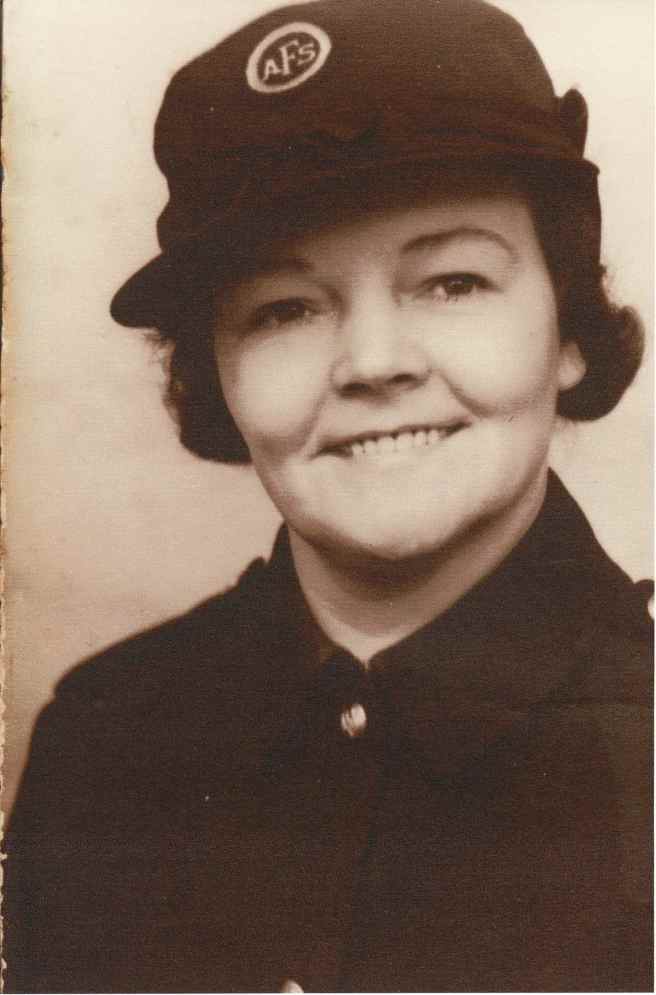
(Winifred Alexandra Peters)
Prior to this bombing raid in the early hours of 20th April 1941, London was in the middle of its biggest bombing campaign of the entire war, from the German Luftwaffe, known as the Blitz. For eight months, from 7th September 1940 to May 11th 1941 London suffered almost continual nightly bombing, over a period of almost 37 weeks, the British capital was attacked 71 times.
The Old Palace School in Poplar in 1941 was an LCC Board School consisting of four stories, much like many of a similar design that remain today. During the Second World War, after the evacuation of London’s children, on the day that the Fire Service was mobilised, it became a sub-fire station, 24U under 24 Brunswick Road. In addition to providing dormitories and living space for the AFS, it was used to accommodate garages, stores, offices and the headquarters of local rescue squads. Being at the centre of much of the industry and dockland in the East End of London, the men who were based there would have been out every night, dealing with massive incendiary fires caused by enemy raids. The night of April 19th/20th was a Saturday and Hitler’s birthday. In celebration, Reichsmarschall Goering had launched an attack on London intended to be the heaviest so far. One thousand and twenty-six tons of high-explosives and a hundred and fifty-three thousand and ninety-six incendiaries are estimated to have been dropped on the capital that night. The sky was overcast and low cloud and drizzling rain made targets difficult to identify so that heavy bombing was scattered over a wide area. One thousand four-hundred fires were started.
By midnight the situation was bad enough in the area around Poplar and further east in West Ham and Walthamstow, for calls for assistance to be sent south of the river. Four crews from Beckenham were standing by at Woodside Fire Station, just outside Croydon. They were ordered to Station 24 Brunswick Road. Stopping briefly at West Norwood Fire Station on the way, they arrived at Brunswick Road, just after 1am and were given tea and biscuits before being directed to the Old Palace School to wait for further instruction. There, along with crews from Hackney and Homerton, the men from Beckenham were mustering in the playground, when at 1.53 am the school received a direct hit from a parachute mine. The bomb penetrated the roof of the school building and fell down the stair well, at the bottom of which, was the watch-room, where two auxiliary firewomen, Winifred Peters and Hilda Dupree, were on duty. They were killed instantly. My Great Aunt, Winifred Peters was thirty-nine years old and married with three children, who had been evacuated at the time to Oxfordshire. Hilda Dupree was twenty-one years old and, as so often happened, would have been on leave that night had she not swapped duties with a friend who wanted to go to a dance.
Parachute mines were originally developed from mines used at sea and later adapted for urban bombing. When released by the Luftwaffe over targets on land they drifted down to ground level detonating either by contact or detonation. Because they exploded above ground the blast from parachute mines caused particularly extensive damage, sometimes demolishing whole streets of houses and breaking windows as far as a mile away. The effect of the blast was also responsible for the deaths of many caught in its after effect, which sucked the air from the lungs causing suffocation. Most of the men waiting in the playground were caught in the blast from the bomb and already dead when, almost simultaneously, they were buried by the part of the school closest to where they were standing, that collapsed on top of them, and fire broke out in what was left of the building.
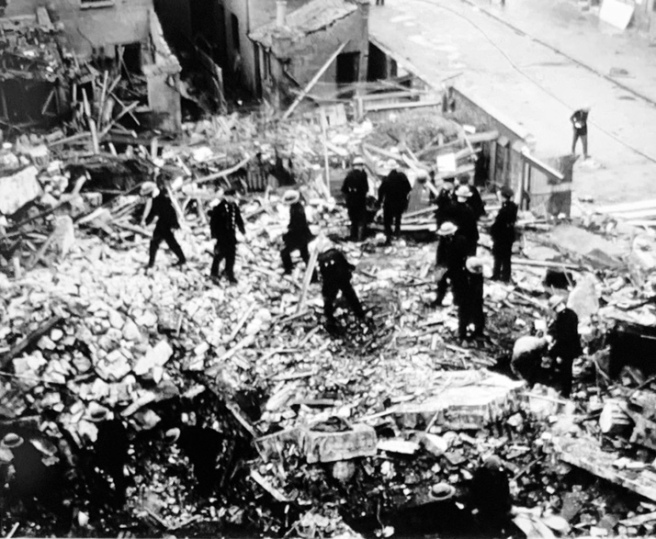
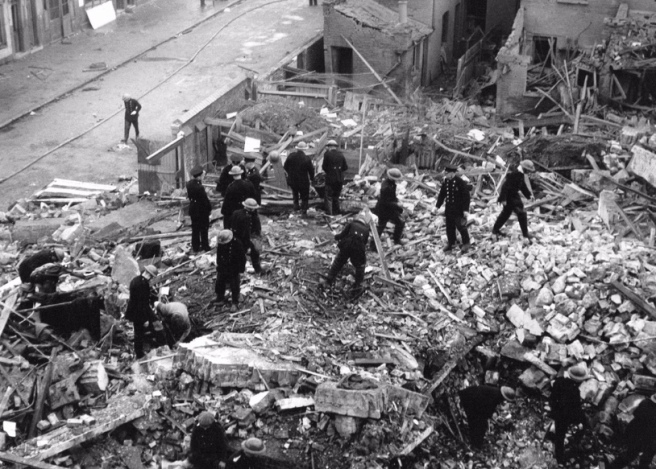
(Searching for the bodies begins)
By the morning the fire was out and the business of digging for the injured and dead had begun. First to be recovered were the women from the watch-room, including my Great Aunt, and their bodies were laid on stretchers on the pavement. David Carson, who served under Bow, being off duty and having heard rumour of the incident, went along as it was getting light, to see if he could help and there he saw them covered by blankets. Later that morning Hilda Dupree’s sister, Joyce, hoping to avoid the distress for her parents, was sent by her family to find out what she could about Hilda. Little more than a girl herself, in her mid-teens, she was confronted by what she described as complete devastation and confusion. Some of the men had also been recovered by the time she arrived and they were laid in a line in a space that had been cleared in the playground, ready to be identified. She remembered thinking that they looked “at peace”. She also noted that they ‘were smiling” which further emphasises the fact that most of them had died from the effects of blast, a grimace not unlike a smile, being an attempt to draw in breath. Hilda had been knitting a little blue child’s vest that she took to the station with her to work on when things were quiet. When Joyce finally found someone to ask about her sister, she was shown what was left of the blue vest and she was able to confirm that one of the women was almost certainly been Hilda.

(Hilda Dupree)
Later, still on the morning of the 20th, officers and men from Penge and Beckenham Fire Brigades arrived and began to identify the bodies of the Beckenham men, as the rubble was cleared. It was a slow and difficult process. Some of the Beckenham firemen described how they were told that some had still been alive, in the early hours of the morning and could be heard under the debris, but had died by the time that rescuers were able to reach them. A number of men were found that day. The dispatch rider, Ernest Henley, was discovered on the 21st and Leonard Roots on the 22nd. Digging carried on with rescuers working in shifts, among them members of the AFS and regular fire service with officers at their side throughout. Until a body was found and identified, a casualty could not be pronounced dead and so while families waited, recovery went on for almost a week. The last body, that of Patrick Campbell, was found on the 26th and taken with all the others to a temporary mortuary in Devons Road. From there the Beckenham men were finally returned home for burial. There were twenty-one of them, the rest being from Hackney and Homerton. Of thirty-two men and two women who died there, all but one, Station Officer Sinstadt, were auxiliaries.
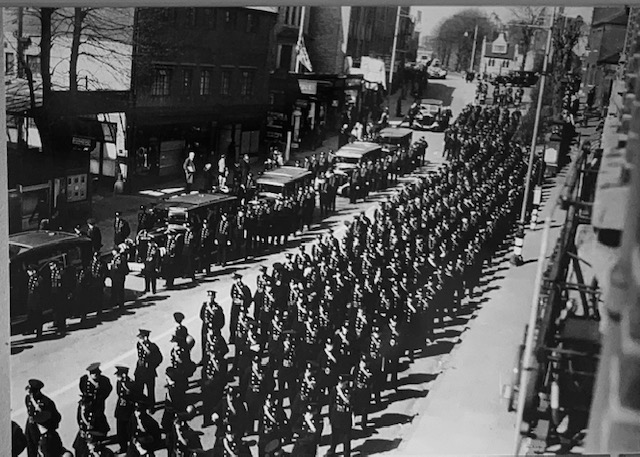
(The Funeral of the Beckenhan Fireman)

(AFS Leading Fireman Leonard Roots – AFS Beckenham)
Thirty-two firemen and two firewomen died at The Old Palace School, the largest number of Fire Brigade lives lost in a single incident, in peacetime or war.
Those that sadly lost their lives are as follows:
AFS Firewoman (Telephonist) Hilda Dupree – AFS London Died 20th April 1941 aged 21, of Warwick Road, Walthamstow, Essex.
Firewoman Winifred Alexandra Peters – London Fire Brigade Died 20th April 1941 aged 39, of Canton Street, Poplar, London
AFS Fireman Percy Charles Aitchison – AFS Beckenham Died 20th April 1941 aged 27, of Copse Avenue, West Wickham, Kent.
AFS Fireman Ronald Mark Bailey – AFS Beckenham Died 20th April 1941 aged 25, of Links Road, Tooting.
AFS Fireman Alan Charles Barber – AFS Beckenham Died 20th April 1941 aged 26, of Fairford Close, Shirley, Croydon, Surrey.
AFS Fireman Earnest Reginald Beadle – AFS Beckenham Died 20th April 1941 aged 32, of Birkbeck Road, Beckenham.
AFS Fireman Kenneth John Bowles – AFS Beckenham Died 20th April 1941 aged 30, of Beckenham Road, West Wickham, Kent.
AFS Fireman John Coleman Barrell – AFS London Died 20th April 1941 aged 35, of North Street, Leigh-on-Sea, Essex.
AFS Fireman Patrick Joseph Campbell – AFS London Died 20th April 1941 aged 24, of Bannister House, Homerton
AFS Fireman Harry John Carden – AFS Beckenham Died 20th April 1941 aged 29, of Mounthurst Road, Hayes, Bromley, Kent.
AFS Fireman Robert John Deans – AFS Beckenham Died 20th April 1941 aged 28, of The Grove, West Wickham, Kent.
AFS Fireman Frank James Endean – AFS Beckenham Died 20th April 1941 aged 36, of Aviemore Way, Beckenham, Kent.
AFS Fireman Cecil Farley – AFS Beckenham Died 20th April 1941 aged 43, of Linden Leas, West Wickham, Kent.
AFS Fireman George John Joseph Hall – AFS Beckenham Died 20th April 1941 aged 30, of Warwick Road, Anerley, Kent.
AFS Messenger Bertie James Frederick Harris – AFS London Died 20th April 1941 aged 17, of Brabazon Street, Poplar, London
AFS Fireman Leslie Thomas Healey– AFS Beckenham Died 20th April 1941 aged 32, of Greenview Avenue, Shirley, Surrey.
AFS Despatch Rider Ernest Herbert Henly _ AFS London Died 20th April 1941 aged 19, of Grange Cottage, Silver Street, Kinton Langley, Chippenham, Wiltshire.
AFS Fireman Sydney Bartholomew Jones – AFS London Died 20th April 1941 aged 31, of Harrogate Road, Hackney.
AFS Fireman Albert Victor Kite – AFS Beckenham Died 20th April 1941 aged 36, of Village Way, Beckenham, Kent.
AFS Fireman John Francis Mead– AFS London Died 20th April 1941 aged 29, of Christie Road, Hackney.
AFS Fireman Vernon Joseph Middleditch – AFS London Died 20th April 1941 aged 31, of Hunters Lane, Darlington, Co. Durham.
AFS Fireman Alfred Edward Minter – AFS Beckenham Died 20th April 1941 aged 46, of Aylesford Avenue, Beckenham, Kent.
AFS Fireman Norman Richard Charles Mountjoy – AFS Beckenham Died 20th April 1941 aged 30, of Ash Grove, West Wickham, Kent
AFS Fireman Frederick George Parcell – AFS Beckenham Died 20th April 1941 aged 32, of Love Lane, South Norwood, Surrey.
AFS Fireman Martin Charles Parfett – AFS Beckenham Died 20th April 1941 aged 31, of Pickhurst Rise, West Wickham, Kent.
AFS Fireman William Charles Plant – AFS Beckenham Died 20th April 1941 aged 26, of Sultan Street, Beckenham, Kent.
AFS Fireman Cyril Bertram Porter – AFS London Died 20th April 1941 aged 31, of Clinton Road, Forest Gate, Essex.
AFS Fireman William Thomas Rashbrook – AFS London Died 20th April 1941 aged 36, of Chatsworth Road, Clapton.
AFS Leading Fireman Leonard Roots – AFS Beckenham Died 20th April 1941 aged 31, of Avenue Court, Avenue Road, Anerley, Kent.
AFS Fireman Albert Alfred Saville – AFS London Died 20th April 1941 aged 35, of Harrowgate Road, Hackney.
Station Officer Richard William Sinstadt – London Fire Brigade Died 20th April 1941 aged 46, of Beccles Drive, Barking, Essex.
AFS Fireman Edgar William Vick – AFS London Died 20th April 1941 aged 38, of Eden Way, Beckenham, Kent.
AFS Leading Fireman Walter John Woodland – AFS Beckenham Died 20th April 1941 aged 41, of Links Way, Eden Park, Beckenham, Kent.
AFS Leading Fireman Herbert Charles Wotton – AFS Beckenham Died 20th April 1941 aged 30, of Upper Elmers End Road, Beckenham, Kent.
This story remained unpublished because of emergency Defense Regulations.
The full details were finally uncovered six decades later by the Firemen Remembered charity which unveiled a memorial in April 1997, at Lansbury Lawrence Primary School, on the site of the old school destroyed 56 years before. The dedication ceremony took place on Saturday 19th April 1997 at The Old Palace School Site, St. Leonard’s Street, London. The Plaque was unveiled by Cyril Demarne OBE, the former Chief Fire Officer of West Ham Fire Brigade, in the presence of The Mayor of The London Borough of Tower Hamlets, Councillor Albert Jacob, The Chair of The London Fire and Civil Defence Authority, Councillor Judith Josling, the families, colleagues and friends of those who died and representatives from The London Fire Brigade, Northamptonshire Fire and Rescue Service, Old Palace School and the local community.
“In memory of the 13 London firemen and women and 21 Beckenham firemen killed on the night of 19th April 1941 when a bomb destroyed the old school being used as a sub-fire station.”
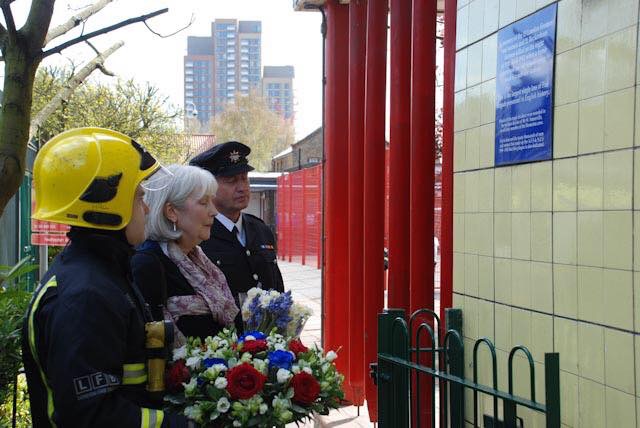
(Taken at the 75th Anniversary)
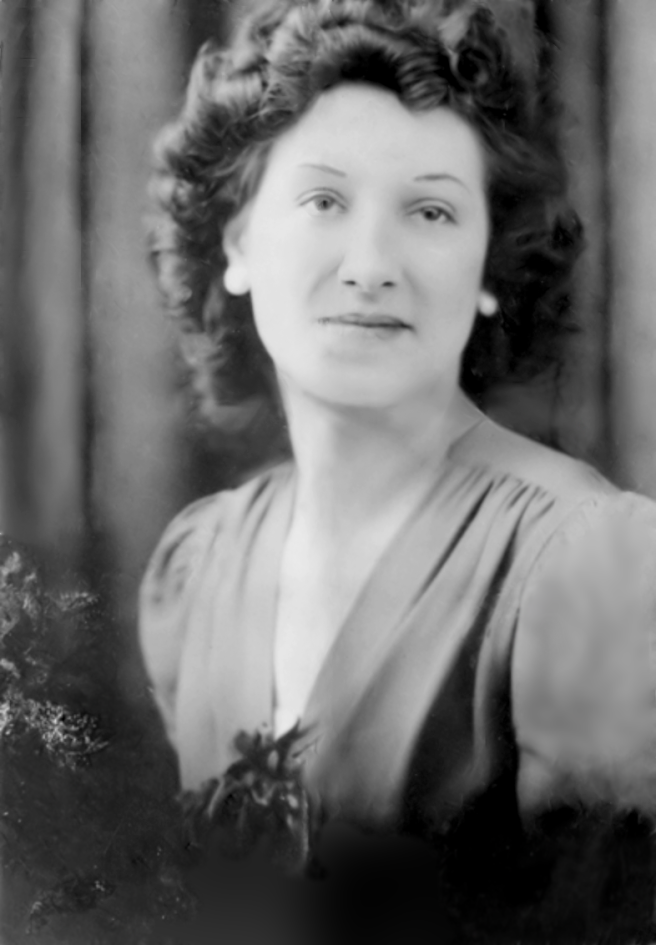
(A kind person restored the image of Hilda to its former glory)
They say that serendipity plays a part in Family History. Two weeks after my Great Aunt Winifred Alexandra Peters sadly lost her life here, my own Mother was born and she was named after her Aunt, “Winifred Alexandra Wootton”.
The Blitz Memorial
By the time that peace was announced in Europe on 8th May 1945, Firefighters had pushed themselves to the limit to save London from destruction. More than 300 Fireman and Fire women, in the London Region, had lost their lives, in the battle and ten times as many were injured. Thirty-seven Firemen and one Firewoman were awarded the George Medal for their bravery and one Fireman was awarded the George Cross. In addition 11 King’s Police and Fire Service Medals were awarded, 3 OBE’s, 13 MBE’s and 118 BEM’s.
Despite their life-saving service, there was no memorial to commemorate the Firefighters wartime actions. Following a nationwide fund-raising campaign a memorial was commissioned to honour them. On the 4th May 1991 Her Majesty Queen Elizabeth the Queen Mother unveiled a statue outside St. Paul’s Cathedral, The Blitz Memorial.
It was decided in 1998 to make the memorial a national monument, that would commemorate not just the Firefighters who died in World War II, but the lives of all Firefighters throughout the United Kingdom, who were killed in the line of duty. The National Firefighters Memorial, as it was re-named, was moved from its original site in Old Change Court and and the names of all those killed in peacetime were added.
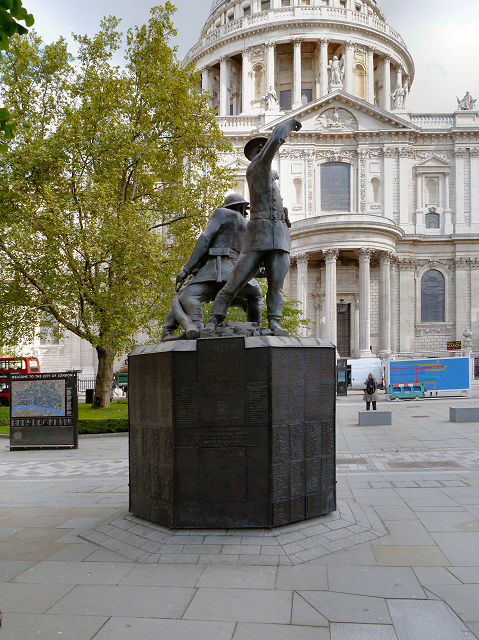
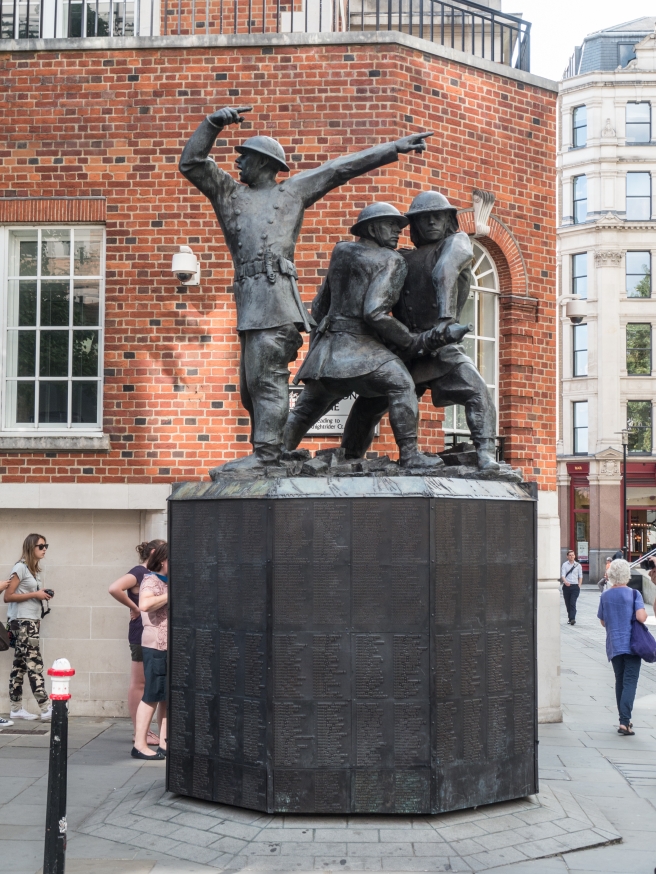

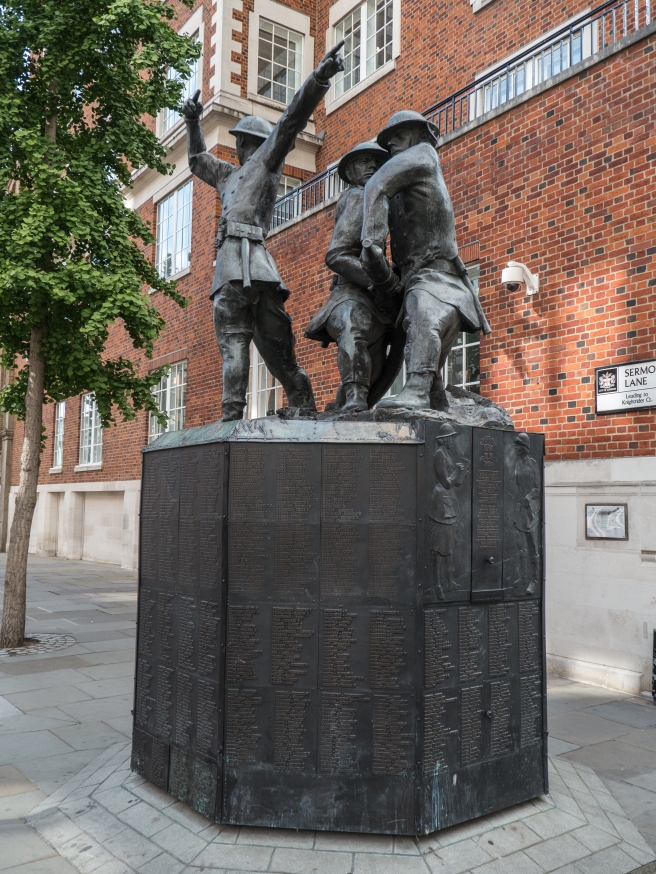
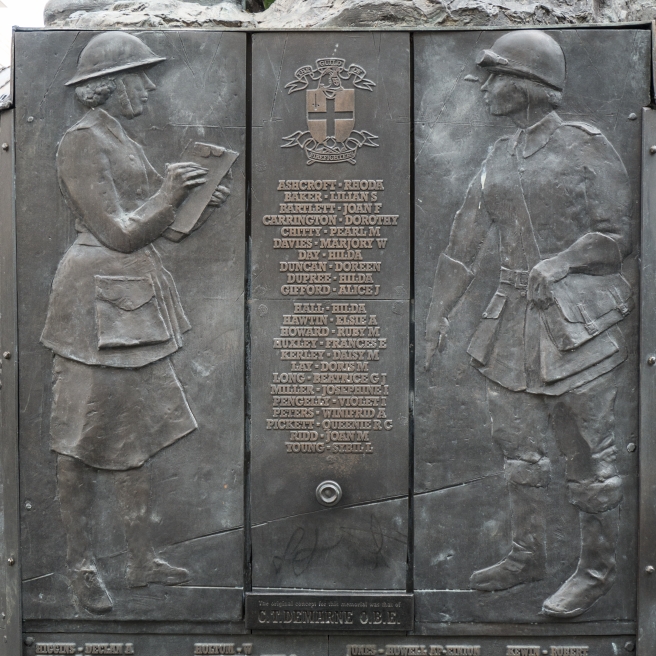
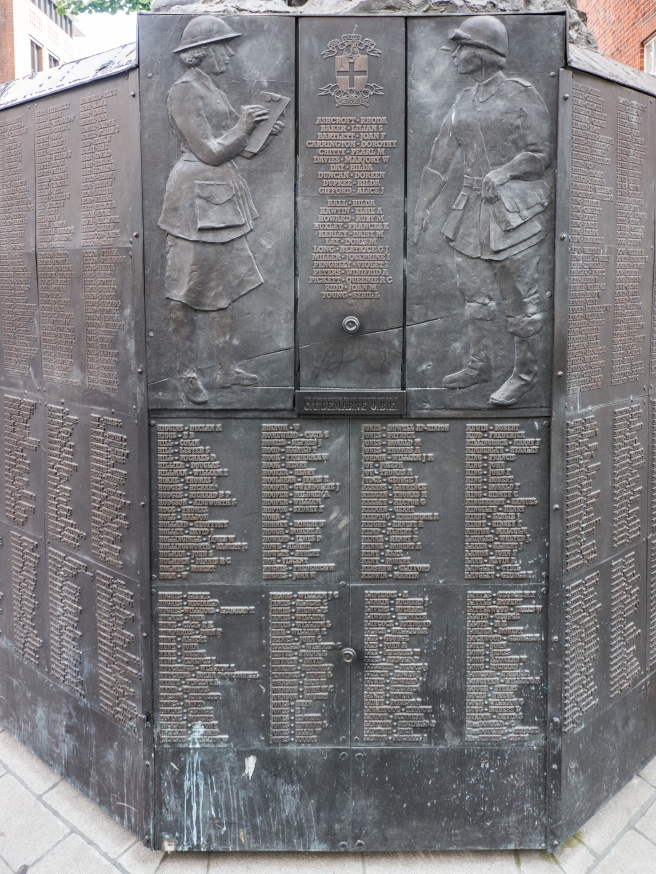
(Photographs of the National Firefighters Memorial were kindly provided by René & Peter van der Krogt, https://statues.vanderkrogt.net.)
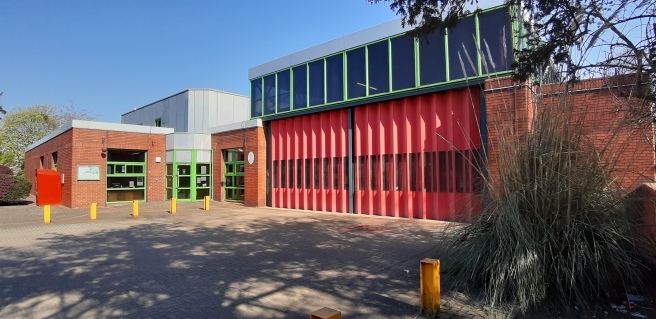
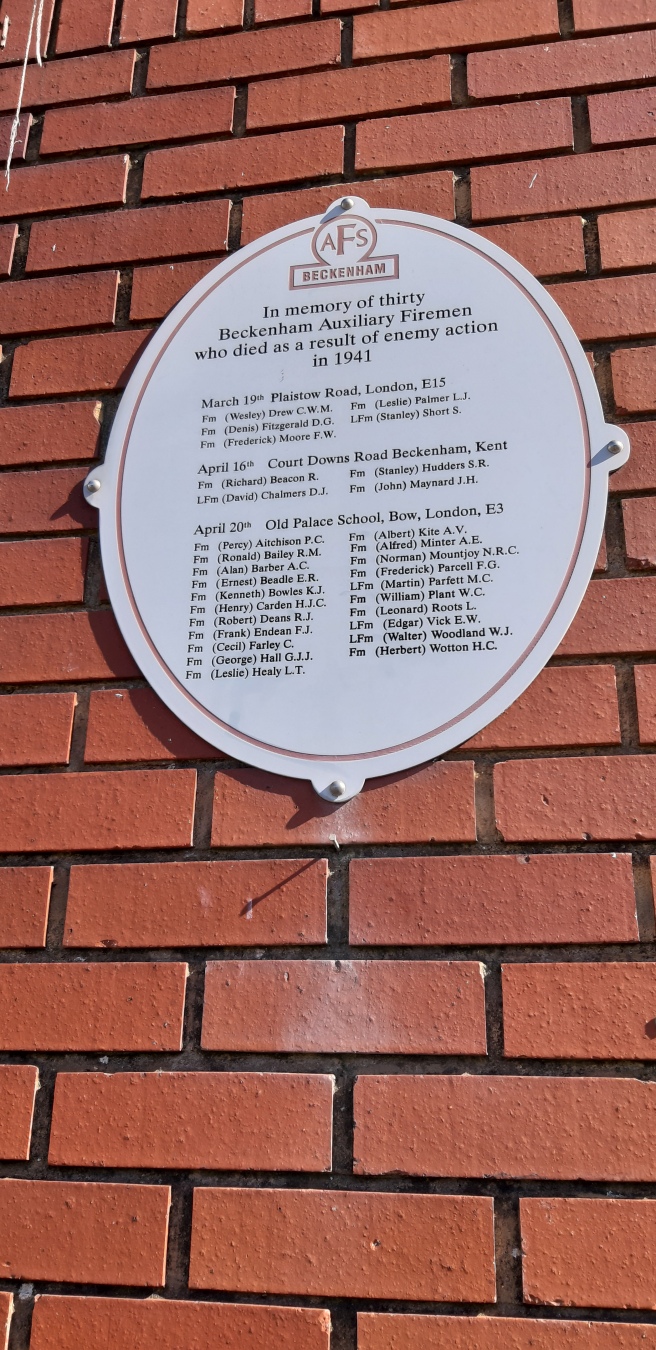
(Pictures of the Beckenham Fire Station and Memorial Plaque kindly provided by Robert Brigden)
A very special mention to my friends, Stephanie Maltman and Jan Briggs, for providing the additional information and the extra photographs, it’s very much appreciated.
Many thanks to the following website also.
https://www.londonremembers.com
All My Blogs For Family Tree Magazine in one Handy Place
Copyright © 2021 Paul Chiddicks | All rights reserved




That was a horrible event surrounded by horrible events. World Wars bring out the terrible.
LikeLiked by 1 person
The horrors and scars of war last a lifetime
LikeLiked by 2 people
We will never know all the stories of what happened.
LikeLike
A lot of these secrets went to the grave
LikeLiked by 1 person
Thank you for doing this Fredrick George parcell was my great-grandfather and didn’t know about this till a couple of days ago when someone messaged me asking if we was related.
LikeLiked by 1 person
Hi Kerrie thank you for your message my email address is chiddicks@yahoo.co.uk if you can drop me an email and I will explain what I am doing next to remember the firemen and women
LikeLike
Hi Kerrie-Anne please drop me an email if you can my email address is chiddicks@yahoo.co.uk thank you
LikeLike
thanks for sharing this
LikeLike
You’re welcome Holly
LikeLiked by 1 person
Family stories bring history alive.
LikeLiked by 1 person
I totally agree with you
LikeLike
They sure do.
LikeLiked by 1 person
Wow, what a story! Very well written.
LikeLike
Thank you Valerie
LikeLike
Wanted to say thank you for introducing me to twitter!
My website has exploded!!
LikeLike
Thank you!
LikeLike
You’re welcome Holly
LikeLiked by 1 person
I am really pleased for you and glad I could help
LikeLiked by 1 person
I have retweeted your blogs about your Dad
LikeLiked by 1 person
Thank You! 🙂
LikeLike
I discovered only last year that my own grandmother was an auxiliary firewoman in London for part of the war. She never talked about those days and even her own daughter had no idea. Thank you for sharing this tragic story – it’s another reminder of what war is really like for those at home.
LikeLiked by 1 person
Thank you Norfolk Nan, we have no idea the sacrifice that our service men and women, both home and abroad gave
LikeLiked by 1 person
Sorry to hear about your Great Aunt. Some of my ancestors lived very near St Leonard Street, although their road no longer exists. All demolished to make way for the Blackwall Tunnel
LikeLiked by 1 person
Thanks mumjd It’s a sad story but only by writing about it can we tell their stories and keep their memories alive
LikeLiked by 2 people
Reblogged this on Bismarck, Dorsetshire and Memories and commented:
http://www.warandpeacesite.wordpress.com
LikeLiked by 1 person
Such a tragedy. Sorry for your loss. War is hell. Great pictures, though, and it looks like you’ve been very thorough in your research. Great work!
LikeLiked by 1 person
Thank you fir your kind words very much appreciated
LikeLiked by 2 people
Looks a lot like “ground zero” in New York City after the bombing. The enemy of our souls never changes his tactics; we should stop blaming God for the evil that does not come from Him (see John 10:10 in the Bible)
LikeLiked by 1 person
The devastation caused by man over the centuries is immeasurable
LikeLiked by 1 person
👍
LikeLike
It was lovely to read this. Especially to see the photo of Hilda Dupree – she is my Great Aunt. I was telling my son about my Aunt Hilda who died in the war and googled her name and this popped up. My mother was born prematurely to Hilda’s eldest sister six weeks after Hilda’s death, and her middle name is Hilda. I was with my Auntie Joyce at the unveiling of the plaque and I know how much is meant to her. Thank you for this Paul. It’s so nice to know more about your family history.
LikeLiked by 1 person
Thank you so much for contacting me Louise my email address is chiddicks@yahoo.co.uk I would like to contact you if possible
LikeLike
I’ve sent you an email.
Louise Betteridge.
LikeLiked by 1 person
Both interesting and moving. God bless them, serving others.
LikeLiked by 1 person
Thanks Gordon much appreciated
LikeLike
Thank you for sharing. A tragic event yet just one of untold many in the war. Genealogy really makes history come alive though, as you see the real impact of events on families. Thanks for sharing.
LikeLiked by 1 person
Thanks Clay for your message, this research project was one of the longest that I have undertaken and something that is very close to my heart
LikeLike
My father was in the AFS during the Blitz . He was from the Highlands but ended up in London at Willesden. I never asked him about it when he was alive and he never spoke of it but since then I have gleaned every bit of information I can find about the fire service at this time. So thank you for the information and for sharing it.
LikeLiked by 1 person
Thanks Cate I’m really pleased to hear that you have enjoyed reading about the AFS during WW2 on my blog site that’s means a lot thank you
LikeLike